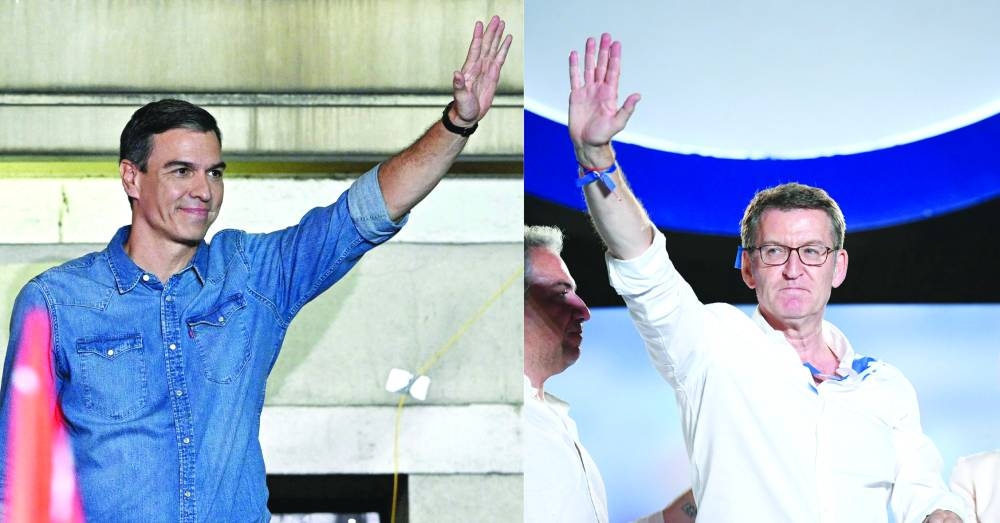Spain’s conservative People’s Party (PP) has started talks with other parties to seek their support to lead a new government while the ruling Socialist (PSOE) party said it wanted to avoid a repeat ballot after Sunday’s election produced a hung parliament.
PP leader Alberto Nunez Feijoo hailed an “indisputable” victory in Sunday’s election even though the right failed to clinch a predicted outright majority.
The PP and the far-right Vox, who were touted as potential coalition partners, earned a combined 169 seats in the 350-seat lower house, falling short of the 176 lawmakers needed to secure a parliamentary majority. It can only form a government with the support of other smaller parties.
“I have initiated the talks taking into account that Spaniards have decided not to give anyone an absolute majority,” Feijoo said, adding: “We will not be held hostage by anyone.”
The ruling Socialists and far-left Sumar won 153 seats — a better-than-expected performance.
Acting Prime Minister Pedro Sanchez has more options to form a government and is expected to seek support from small Basque and Catalan separatist parties, as he did following 2019’s election.
Among these are left-wing separatist party Esquerra Republicana de Catalunya (ERC), which has seven seats. Sanchez would also likely need the backing of the more hardline Junts, which has not supported him in the past four years and also holds seven seats.
The PP will be given the first stab at trying to cobble together enough votes in parliament to form a government. But a deal with Vox and its tough stance on separatism will make it difficult to gain support from any other faction.
The People’s Union of Navarre (UPN) — which has one seat — is the only other centre-right party expected to support Feijoo’s bid for the premiership, leaving him six votes short.
The regionalist Canary Coalition, which also has one lawmaker, governs in the Canary Islands together with the PP but has publicly rejected Vox’s discourse.
The remaining parties have signalled their opposition to any coalition that includes the far right.
Sanchez’s chances of success could be decided by former Catalan regional government president Carles Puigdemont, who lives in self-imposed exile in Belgium since leading a failed push to split Catalonia from Spain in 2017.
If Sanchez can secure the five seats from the Basque Nationalist Party, six seats from Bildu and seven seats from ERC, as he did in 2020, an abstention from Junts would still be enough for his PSOE-Sumar coalition to win an investiture vote.
Junts Secretary-General Jordi Turull said yesterday he would use the “window of opportunity” created by the election impasse to achieve Catalan independence.
Turull was among the nine Catalan jailed separatist leaders pardoned by Sanchez in 2021 for their role in the 2017 independence bid. However, many more are still facing trial, chief amongst them Puigdemont.
Puigdemont, who still wields considerable influence within Junts, said in mid-July the party would not support Sanchez. Early yesterday he tweeted that Junts is a party that keeps its word. Puigdemont was stripped of the immunity he had as a member of the European Parliament earlier this month, paving the way for his extradition. Spain’s prosecutor yesterday reissued a capture order against Puigdemont. He could face between six to 12 years in prison for embezzlement, the prosecutor’s office said.
A PSOE source said the party was confident of reaching an agreement but that negotiations would take time.
“We are sure about that, and that there will be no repetition (of the election),” the source said.
Sumar lawmaker Jaume Asens has already begun talks with Junts on the platform’s behalf, a source in the party said.
Going into the election, the PP looked set to forge a winning alliance with Vox — an outcome that would have brought hardline nationalists into government for the first time since the end of the Franco dictatorship and Spain’s return to democracy in the 1970s.
The deadlock leaves the country in limbo. If neither bloc is able to garner enough parliamentary support to form a government, a second election around Christmas-time is probable, Eurointelligence said in a note.
Another PSOE source said the party would leave the PP to make the first attempt to form a government.
“There’s no rush, let Feijoo do what he wants to do,” the source said. “The next step is to go on holiday.”
International
Parties in talks to break Spain stalemate
If neither of the blocs succeed, a second election is probable

Spanish Prime Minister and Socialist Party (PSOE) candidate for re-election Pedro Sanchez (left) and leader and candidate of conservative Partido Popular (People’s Party) Alberto Nunez Feijoo waving at their headquarters in Madrid after Spain’s general election. (AFP)
